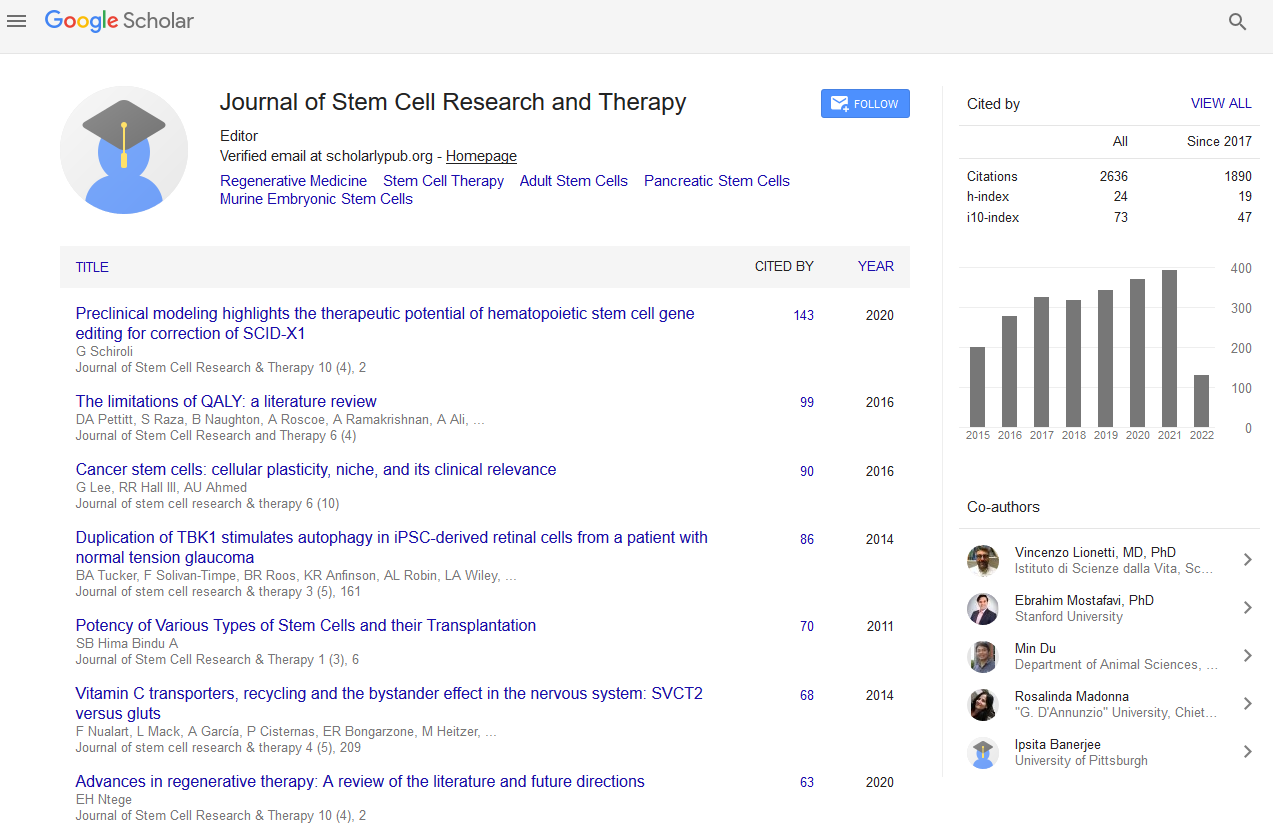Indexed In
- Open J Gate
- Genamics JournalSeek
- Academic Keys
- JournalTOCs
- China National Knowledge Infrastructure (CNKI)
- Ulrich's Periodicals Directory
- RefSeek
- Hamdard University
- EBSCO A-Z
- Directory of Abstract Indexing for Journals
- OCLC- WorldCat
- Publons
- Geneva Foundation for Medical Education and Research
- Euro Pub
- Google Scholar
Useful Links
Share This Page
Journal Flyer

Open Access Journals
- Agri and Aquaculture
- Biochemistry
- Bioinformatics & Systems Biology
- Business & Management
- Chemistry
- Clinical Sciences
- Engineering
- Food & Nutrition
- General Science
- Genetics & Molecular Biology
- Immunology & Microbiology
- Medical Sciences
- Neuroscience & Psychology
- Nursing & Health Care
- Pharmaceutical Sciences
Expression profile of cancer Stem Cell markers in Glioblastoma derived CD133 + and CD133- cells
9th Annual Conference on Stem Cell and Regenerative Medicine
September 25-26, 2017 Berlin, Germany
Asuman Sunguroglu, Merve Gulsen Bal, Seyma Ozkanca, Hasan Caglar Ugur and Dilara Akcora Yildiz
Ankara University, Turkey
Mehmet Akif Ersoy University, Turkey
Scientific Tracks Abstracts: J Stem Cell Res Ther
Abstract:
Background/Aim: Glioblastoma, known as Glioblastoma Multiforme (GBM), is the most common and aggressive type of brain tumours in adults and contains self-renewing, tumorigenic cancer stem cells (CSCs) that can account for tumour initiation and acquisition of resistance to the given anti-GBM therapies. The neural stem cell marker CD133, known as prominin-1, has been widely used as a CSCs marker in GBM. Although, there is some controversy regarding tumour-initiating properties of CD133+ and CD133- GBM cells, a growing number of studies have revealed GBM initiating stem cell capability of CD133+ cells. Elucidation of the molecular characterization of GBM CSCs is essential for the development of novel targeted therapeutics for GBM. Therefore, we aimed to determine the expression levels of other potential CSC markers in CD133+ GBM CSCs. Materials and Methods: Primary GBM cells were isolated from freshly obtained GBM tissue samples derived from ten individual patients. These cells were cultured with DMEM with high glucose including 1% Penicillin-Streptomycin and 10% fetal bovine serum. Then, CD133+ and CD133- cells were separated by MACS (Miltenyi) method from those GBM primary cells. The CD133+ selected and CD133- cell populations were collected in different tubes. Following RNA isolation from CD133+ and CD133- cells, cDNA synthesis was performed. mRNA expression levels of 88 genes were detected by Real Time Cancer Stem Cell PCR Array (Bio-Rad). The Student T test was used to identify statistically significant differences between groups. Differences were accepted to be statistically significant at p<0.05. Confocal microscopy was performed to examine the localization of CD38 and CD24 proteins in CD133+ GBM CSCs. Results: Based on the results of PCR Array, we found that the mRNA levels of ABCG2, ALCAM, CD24, CD38, CD4, DDR1, EGF, ENG, ETFA, FGFR2, FLOT2, FZD7, GSK3B, ID1, IKBKB, ITGA2, ITGA4, ITGA6, ITGB1, JAG1, MAML1, MUC1, MYCN, NFKB1, NOTCH2, PLAT, PLAUR, POU5F1 and BMP7 were statistically different in CD133+ GBM CSCs when compared to expression of those in CD133- cells. Furthermore, we investigated protein levels of CD38 and CD24 in both CD133+ and CD133- cells and observed that protein expression of both CD38 and CD24 was more prominent in CD133+ GBM CSCs than in CD133- cells. Conclusion: Our results suggest that in addition to the presence of CD133 expression GBM initiating cells have also the expression of different genes involved in distinct survival pathways, indicating tracing these possible candidates could be useful for characterization of CD133+ GBM stem cells. This research has been supported by The Scientific and Technological Research Council of Turkey (No: 114S189).
Biography :
Asuman Sunguro�?lu is Professor at Medical Faculty of Ankara University. She graduated from Hacettepe University, Faculty of Science, Department of Biology, Ankara, Turkey. She got the Master’s Degree in “Tumour Immunology” in 1987 from Medical Faculty of Hacettepe University. She received her PhD degree in “Medical Biology” from Ankara University, Medical Faculty in 1992. Her research focuses on cancer and leukaemia cytogenetics in humans. In order to specialise and gain knowledge and practice, she was assigned in the University of Welsh, Medical Faculty in Cardiff for 6 months in 1996. She was named Associate Professor in 1997 and Professor in 2003. She has been Chair of Medical Biology Department since 2003. She is the member of Advisory Committee of the Scientific and Technological Research Council of Turkey (TUBİTAK). She received several grants, awards and fellowships from organizations such as Turkish Heart Association, Ankara University and TUBİTAK for her research projects. Her current research interests in molecular mechanisms of cancer stem cells, understanding the molecular basis of Infertility, Monoclonal Antibody production and immunotherapies for cancer.


